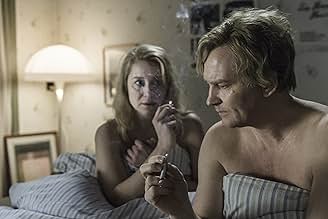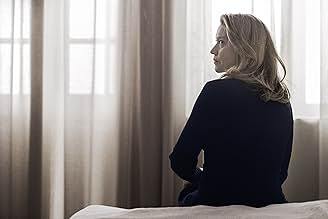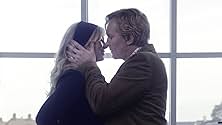IMDb-BEWERTUNG
6,4/10
8542
IHRE BEWERTUNG
Eine Geschichte über den Konflikt zwischen persönlichen Wünschen und der Solidarität und Toleranz in einer dänischen Kommune in den 1970ern.Eine Geschichte über den Konflikt zwischen persönlichen Wünschen und der Solidarität und Toleranz in einer dänischen Kommune in den 1970ern.Eine Geschichte über den Konflikt zwischen persönlichen Wünschen und der Solidarität und Toleranz in einer dänischen Kommune in den 1970ern.
- Auszeichnungen
- 6 Gewinne & 21 Nominierungen insgesamt
Empfohlene Bewertungen
A middle class Danish couple find that they have inherited a rather grand house on the death of Erik's father. It is going to be too big for them and their only daughter and more over too hard to finance and so Anna suggests they invite a few others to live with them and for a 'Kollektivet' or as we would call it a commune.
They waste little to no time in getting an assorted array of waifs and not so strays and soon fine that communal living bring challenges and opportunities in equal measure. Not all of them are going to be easy to grasp and the tensions, that go hand in hand with any social experiment, waste no time in pushing their way to the fore.
Now I really liked this, I loved the idea of a commune having spent time in one in the eighties (when they were a bit passé to be honest) and the themes are explored here but also the lives of the main characters are mostly to the fore. This is Anna played brilliantly by Trine Dryholm – 'The Legacy' and her husband Erik (Ulrich Thomsen – 'The Blacklist') and their young daughter who is growing up much too quickly. His is from director Thomas Vinterberg who brought us 'The Hunt' in 2012 and 'The Celebration' in 1998 and I think he has an eye for style but sometimes struggles to engage, but here I think he has melded all parts of the art very well together to bring a very entertaining watch – recommended.
They waste little to no time in getting an assorted array of waifs and not so strays and soon fine that communal living bring challenges and opportunities in equal measure. Not all of them are going to be easy to grasp and the tensions, that go hand in hand with any social experiment, waste no time in pushing their way to the fore.
Now I really liked this, I loved the idea of a commune having spent time in one in the eighties (when they were a bit passé to be honest) and the themes are explored here but also the lives of the main characters are mostly to the fore. This is Anna played brilliantly by Trine Dryholm – 'The Legacy' and her husband Erik (Ulrich Thomsen – 'The Blacklist') and their young daughter who is growing up much too quickly. His is from director Thomas Vinterberg who brought us 'The Hunt' in 2012 and 'The Celebration' in 1998 and I think he has an eye for style but sometimes struggles to engage, but here I think he has melded all parts of the art very well together to bring a very entertaining watch – recommended.
Less difficult to watch then The Hunt or Festen, Thomas Vinterberg's Kollektivet (The Commune) impresses with great cinematography and how successfully it seems to reconstruct the details of the sixties and seventies fashion in Copenhagen, Denmark. But at the same time, it fails to deliver a truly engaging story. It's an interesting story, it's an exotic story, but the situations presented are so unfamiliar for someone who hasn't even considered living in a commune that it simply makes the plot hard to relate to. The Danish director apparently grew in a commune, but that doesn't mean that the story is autobiographical. However, it is pretty obvious that such a subject couldn't be presented so convincingly by someone without the experience of living in a commune. European movies are more and more something of an alternative cinema treat and this movie is a quite a delight from that perspective. The alternative lifestyle of the protagonists is presented in such detail that it doesn't seem forced or artificial. Most of the characters have strong personalities, but these are kind of ignored, as the pace is too quick to stop for them. Ultimately, what truly sticks out in your memory hours even after watching the movie is a very sad love story. A story about allowing extreme changes to your lifestyle and then having to bear all the consequences, with all the associated happiness and tears. "Maybe this is what people use to do in the Northern parts of Europe, I don't know what to say" was the first reaction of someone in the audience that I overheard at the European Film Festival, after the Bucharest opening screening. I kind of agreed. It is quite difficult to relate to a movie about an extreme leftist commune from Denmark. However, if you like strange stories that show with great talent a historical time and place, then The Commune is something you might fully appreciate. Yes, the action could also take place in a more modern setting, as the world is full of communes. However, what really makes this movie watchable is the love invested in recreating the look & feel of a defunct 20th century decade as seen and felt in a Northern Europe capital by a truly talented and hard- working director.
Vinterberg, understandably having grown up in a commune, doesn't properly establish the hippy commune lifestyle. Probably because to him, that's just what he grew up with. He assumes you already know (and I do) but most people don't (or haven't thought about it) so the film feels severely lacking in world building. If this movie were an essay the first paragraph with the hypothesis is missing. Tell us a little bit about the ideology behind the choice in lifestyle; you did it beautifully did with Druk! Without it, the dramatic, emotional and ideological arithmetic doesn't quite add up. Have Ole tells us a bit about his left wing literature! Not to mention, Vinterberg shares nothing of the drug culture that the hippy lifestyle so adamantly relies on. Squash any human instinct/desire with a physical simulation; that's the hippy way. Feel unhappy: drink. You don't get that spark from learning something new? Just take a smoke and you'll get that spark relearning things you already know. Everything is material for the hippy, everything superficial. Real emotions always denied because we have pills for that! This film severely lacked a proper set up of that world in the first half.
That being said, this film develops into a deeply pertinent and important message. He perfectly diagnoses the problems with a hippy approach to a family structure. And I know this because my own family was a victim of this way of life. The mom in the film is my mom. The dad is my dad. The people in the film are from 70s Denmark, and my parents are from 90s LA. And while we live miles apart, the way of thinking leads to the same outcomes, and I have to repeat: Vinterberg perfectly diagnoses the problem with this type of thinking. While the woman may be the one suggesting a free love lifestyle, it's ultimately the women who will always suffer. The patriarch is to blame because he is the leader, whether or not he rhetorically offloads his duty to others.
The institution of marriage protects women, as their prospects of love virtually become null and void once they become old and ugly. The man however can remarry. This is why marriage exists. My parents were stupid enough to never make this observation and like in the movie, my mom ended up hooked on pills and alcohol while my father ran off with his tight new muse. And if you think the corporate world has any interest in supporting old women, think again.
That being said, this film develops into a deeply pertinent and important message. He perfectly diagnoses the problems with a hippy approach to a family structure. And I know this because my own family was a victim of this way of life. The mom in the film is my mom. The dad is my dad. The people in the film are from 70s Denmark, and my parents are from 90s LA. And while we live miles apart, the way of thinking leads to the same outcomes, and I have to repeat: Vinterberg perfectly diagnoses the problem with this type of thinking. While the woman may be the one suggesting a free love lifestyle, it's ultimately the women who will always suffer. The patriarch is to blame because he is the leader, whether or not he rhetorically offloads his duty to others.
The institution of marriage protects women, as their prospects of love virtually become null and void once they become old and ugly. The man however can remarry. This is why marriage exists. My parents were stupid enough to never make this observation and like in the movie, my mom ended up hooked on pills and alcohol while my father ran off with his tight new muse. And if you think the corporate world has any interest in supporting old women, think again.
"The Commune" at the center of Thomas Vinterberg's film isn't typical of the communes I knew back in the day. For a start, the members of this one are reasonably well off and are mostly middle-aged and, of course, they bring to this 'living together' thing all the baggage you would expect. Things come to a head when commune founder Erik, (Ulrich Thomsen), falls for one of his students and moves her in leading his wife Anna, (Trine Dyrholm), to have a nervous breakdown.
Vinterberg's film began life as a play and it's certainly very theatrical but despite the emotional conflicts at the film's heart, it's also fairly conventional with everyone other than Erik and Anna fading very much into the background. You never get to know any of them. Subplots come and go and it just trudges on. On the plus side, it's very well acted particularly by Dyrholm who won the Best Actress prize at Berlin; she's the only one you actually care about. It might have worked better on stage where at least you could feel 'in the same place' as these commune-dwellers. On screen, it just feels like another piece of Vinterberg navel-gazing.
Vinterberg's film began life as a play and it's certainly very theatrical but despite the emotional conflicts at the film's heart, it's also fairly conventional with everyone other than Erik and Anna fading very much into the background. You never get to know any of them. Subplots come and go and it just trudges on. On the plus side, it's very well acted particularly by Dyrholm who won the Best Actress prize at Berlin; she's the only one you actually care about. It might have worked better on stage where at least you could feel 'in the same place' as these commune-dwellers. On screen, it just feels like another piece of Vinterberg navel-gazing.
"The Commune" brings the story of Eric and Anna. As the movie opens, we see the couple looking at the huge house of Erik's deceased father. The couple really can't afford to keep the house, but at Anna's suggestion, they invite several other people to join them (and pay rent). All together, they are now 9, of which 2 kids (including Anna and Erik's 14 yr. old daughter Freja). Then, just as things seem to go quite well, Erik starts an affair with Emma, a 24 yr. old student of his. What impact will that have on the commune? To tell you more of the plot would spoil your viewing experience, you'll just have to see for yourself how it all plays out.
Couple of comments: this is the latest movie from Danish writer-director Thomas Vinterberg, whose work includes 2015's "Far From the Madding Crowd" and before that, the excellent "Hunt" in 2012. Here, after going "Hollywood" in his previous movie, he returns to his Danish roots and brings us a story set in the 1970s, when the concept of morality and conformity were quite different from what we now know them to be. This movie turned out to be a bit different from what I expected it to be. It's not really about "hippies living together and being one with nature", but rather a study of what one man's affair means for the immediate group around him, including of course first and foremost his wife, a slightly aging but very popular TV news anchor. The film also spends quite of time looking at the 14 yr. old girl, and in that sense is also partly a coming of age movie. There are a couple of acting performances that will knock you out, none more so that Trine Dyrholm in the role of Anna, but Ulrich Thomsen as Erik certainly should be mentioned to.
I recently saw "The Commune" at the Landmark E Street Cinema in Washington DC. The Saturday evening screening that I saw it at was attended okay but not super. That's a shame, but maybe this movie will find a wider audience on Amazon Instant Video or eventually on DVD/Blu-ray. If you are in the mood for a quality foreign film that is in part a relationship drama and in part a coming-of-age movie, I'd readily recommend you see this out.
Couple of comments: this is the latest movie from Danish writer-director Thomas Vinterberg, whose work includes 2015's "Far From the Madding Crowd" and before that, the excellent "Hunt" in 2012. Here, after going "Hollywood" in his previous movie, he returns to his Danish roots and brings us a story set in the 1970s, when the concept of morality and conformity were quite different from what we now know them to be. This movie turned out to be a bit different from what I expected it to be. It's not really about "hippies living together and being one with nature", but rather a study of what one man's affair means for the immediate group around him, including of course first and foremost his wife, a slightly aging but very popular TV news anchor. The film also spends quite of time looking at the 14 yr. old girl, and in that sense is also partly a coming of age movie. There are a couple of acting performances that will knock you out, none more so that Trine Dyrholm in the role of Anna, but Ulrich Thomsen as Erik certainly should be mentioned to.
I recently saw "The Commune" at the Landmark E Street Cinema in Washington DC. The Saturday evening screening that I saw it at was attended okay but not super. That's a shame, but maybe this movie will find a wider audience on Amazon Instant Video or eventually on DVD/Blu-ray. If you are in the mood for a quality foreign film that is in part a relationship drama and in part a coming-of-age movie, I'd readily recommend you see this out.
Wusstest du schon
- WissenswertesThe film is based on Thomas Vinterberg's play of the same name, which is inspired by his colourful childhood in an academic commune north of Copenhagen.
- PatzerThe signs on the bus stops were not introduced until the late 80's or 90's.
Top-Auswahl
Melde dich zum Bewerten an und greife auf die Watchlist für personalisierte Empfehlungen zu.
- How long is The Commune?Powered by Alexa
Details
- Erscheinungsdatum
- Herkunftsländer
- Offizielle Standorte
- Sprache
- Auch bekannt als
- The Commune
- Drehorte
- Hellerup, Sjælland, Dänemark(location)
- Produktionsfirmen
- Weitere beteiligte Unternehmen bei IMDbPro anzeigen
Box Office
- Bruttoertrag in den USA und Kanada
- 38.737 $
- Eröffnungswochenende in den USA und in Kanada
- 9.249 $
- 21. Mai 2017
- Weltweiter Bruttoertrag
- 4.410.339 $
- Laufzeit
- 1 Std. 51 Min.(111 min)
- Farbe
- Sound-Mix
- Seitenverhältnis
- 2.35 : 1
Zu dieser Seite beitragen
Bearbeitung vorschlagen oder fehlenden Inhalt hinzufügen
















